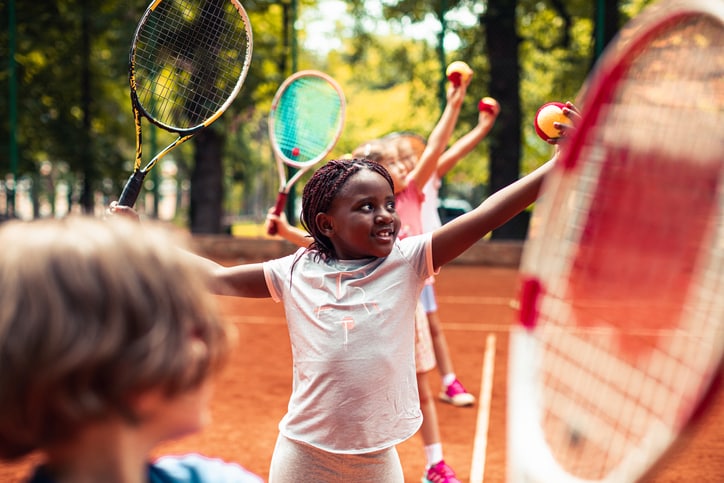Activites, Camps and After School Classes Near Me
Basketball Camp - Ball Handling and Scoring Skills
by Breakthrough Basketball
Columbus, OH
Have fun and rapidly improve your skills at this youth basketball camp. This 2025 summer basketball camp focuses on developing better scoring moves, ball handling, and playmaking ability! At these basketball camps, you improve your scoring, ball handling, shooting, passing, athleticism, footwork, decision-making, and 1 on 1 moves to take your game to the next level! Explosive dribble moves that make you hard to guard. Highly effective scoring moves that work at any level. Game like shooting drills to drive up your shooting percentage. How to create 2-3 feet of separation from any defender for better scoring opportunities. The best hand-eye coordination and ball handling drills that will accelerate your feel for the basketball. These drills will make dribbling during game situations feel easy. How to develop an explosive first step. The secrets behind the proper shin angle, head position, shoulder position, and hip position. Critical components of basketball IQ required to become a great offensive player from an individual and team aspect. How the top pros create advantages which allow them to make plays for themselves and their teammates. The most efficient scoring moves around the basket that helps you finish against any defender.
In-person
Ages 8-14 years
Family Play
99%
by Gymboree Play & Music, Columbus OH
Columbus, OH
More adventures come to life through imaginary play in this multi-age play class. A perfect opportunity for siblings to experience class together, or for children to practice more diverse social skills like leadership and peer modeling.
In-person
6 months - 5 years
Family Art
99%
by Gymboree Play & Music, Columbus OH
Columbus, OH
Paint, sing, sculpt and imagine in a uniquely creative space! Your little one will gain confidence in self-expression and artistic exploration through a hands-on, multimedia experience. Art classes are suitable for toddlers and preschoolers.
In-person
Ages 1-5 years
Basketball Camp - Essential Youth Skills & Decision Making
by Breakthrough Basketball
Gahanna, OH
Have fun and rapidly improve your skills at this youth basketball camp. At these basketball camps, you improve your scoring, ball handling, shooting, passing, athleticism, footwork, decision-making, and 1 on 1 moves to take your game to the next level! You will learn the techniques and skill needed to become a great shooter. You will learn the essential skills to becoming a great ball handler… no fluff. You will learn how to make more lay ups. You will learn how to become a defensive stopper and rebounding machine. You will learn the critical components of basketball IQ required to become a great offensive player from an individual and team aspect. We will teach you all of the critical skills and concepts that coaches love and help players excel.
In-person
Ages 8-14 years
Basketball Camp - Shooting & Offensive Skills
by Breakthrough Basketball
Columbus, OH
This specialized camp will give you the drills and instruction you need to become a top-flight shooter who stands out from the competition. Go into season ready to increase your shooting percentage and range with better mechanics and more confidence in your shot. These are the secrets perfected by the world’s greatest shooters, and now they’re yours as part of the intensive Shooting & Offensive Skills Camp. What will players get out of the basketball camp? -Shooting fundamentals that will quickly boost your FG and FT % (stance, release point, hand position and follow through) -Common mistakes that limit players’ shooting ability (and quick fixes for each) -How to develop a quicker release to get better looks and avoid getting blocked -The “Steve Nash Adjustment” that extends your shooting range while staying accurate -Proper body positioning for maximum shooting accuracy -Techniques for creating space so you get more clean looks at the basket -Pro-level secrets for shooting off the dribble -Catch-and-shoot fundamentals for varying game situations -The “shooters mentality” that will immediately give you a psychological edge in every situation
In-person
Ages 10-16 years
sibling discount
School Skills
99%
by Gymboree Play & Music, Columbus OH
Columbus, OH
Encourage curiosity and build self-confidence in your preschooler through art, science exploration, play and more. Teachers guide students to explore key social and emotional skills and engage in STEAM based activities that assist with school readiness.
In-person
Ages 3-6 years
Crawlers / Walkers
99%
by Gymboree Play & Music, Columbus OH
Columbus, OH
Explore your little one's newfound mobility and give them a safe space to practice their growing skills every week! Classes incorporate diverse physical movements like climbing, crawling, and balancing to support healthy muscle and bone development, while also practicing social skills and memory building through sing-alongs and group-play.
In-person
6 months - 1 years
Runners
99%
by Gymboree Play & Music, Columbus OH
Columbus, OH
It’s all about opposites! Loud and quiet, fast and slow, up and down! Contrasting ‘themes’ means your child is learning better ways to communicate. Explore the different equipment pieces each week to build problem solving, navigating skills, and confidence.
In-person
Ages 1-2 years
Explorers
99%
by Gymboree Play & Music, Columbus OH
Columbus, OH
Our play floor comes to life with trips to the grocery store, eating pizza, finding animals, and even bugs! School is just around the corner, and in this class, you get to witness your child’s imagination come to life and be part of their learning journey.
In-person
Ages 1-3 years
Preschool Prep
99%
by Gymboree Play & Music, Columbus OH
Columbus, OH
Parent/child play time is followed by a gentle separation time where children are engaged by expert teachers in social activities and brain games like puzzles, playdough and story time. Class ends with celebration and the return of the adults, reminding children that adults always come back!
In-person
Ages 1-3 years
sibling discount
MDV Online: Verloren
100%
by Masters of the Dungeon Verse
*This series is invite-only. If you are interested in attending, and have not been invited, please contact greetings@mdv.world!* Join us in an adventure to save a continent in an entirely original fantasy world. Players will take on the role of hero characters in a world filled with opportunities to help and dangers to encounter, all through the safety of a fictional setting. Players will learn to collaborate with others, develop leadership and communication skills, and have experience solving complicated problems. The story they participate in reacts to the decisions they make each week, and will have rewards and consequences based on previous actions. So, join in the adventure, and see if you can Master the Dungeon Verse! You may enroll for as many sessions as you'd like all at once, or week by week. You do not need to attend every session to be a part of the program. Registration will close the day before a session. We will need a minimum of 3 players enrolled in the session for it to run. If we don't have enough players enrolled, you will be informed the morning of and receive a full refund/credit as you choose. If you have any questions, please reach out to greetings@mdv.world. Disclaimer: The game will feature sequences of fantasy combat, such as fighting a dragon or goblins. There will be no gore (defeated enemies poof into dust) and player actions regarding violence will be moderated by the Game Runner. Immoral actions, like hurting innocents or threatening other players, are not allowed. Note: The age range for this series is approximate. Exceptions may be made on a case-by-case basis depending on a player's age, maturity level, and scheduling availability.
Online
Ages 14-17 years
sibling discount
MDV Online: Citadel Counteroffensive
100%
by Masters of the Dungeon Verse
*This series is invite-only. If you are interested in attending, and have not been invited, please contact greetings@mdv.world!* Join us in an adventure to save a continent in an entirely original fantasy world. Players will take on the role of hero characters in a world filled with opportunities to help and dangers to encounter, all through the safety of a fictional setting. Players will learn to collaborate with others, develop leadership and communication skills, and have experience solving complicated problems. The story they participate in reacts to the decisions they make each week, and will have rewards and consequences based on previous actions. So, join in the adventure, and see if you can Master the Dungeon Verse! You may enroll for as many sessions as you'd like all at once, or week by week. You do not need to attend every session to be a part of the program. Registration will close the day before a session. We will need a minimum of 3 players enrolled in the session for it to run. If we don't have enough players enrolled, you will be informed the morning of and receive a full refund/credit as you choose. If you have any questions, please reach out to greetings@mdv.world. Disclaimer: The game will feature sequences of fantasy combat, such as fighting a dragon or goblins. There will be no gore (defeated enemies poof into dust) and player actions regarding violence will be moderated by the Game Runner. Immoral actions, like hurting innocents or threatening other players, are not allowed. Note: The age range for this series is approximate. Exceptions may be made on a case-by-case basis depending on a player's age, maturity level, and scheduling availability.
Online
Ages 11-17 years
Kids Online Python Camp
100%
by Young Gates
In this course, students will learn python tools, variables, data types, string manipulation, operators,, and more. First, the concepts are explained, followed by coding examples. Students will get a chance to execute the code as well. They will be challenged with additional exercises to deepen their knowledge. Students need a laptop and internet connection. NO ipads and tablets. The break-up of the syllabus in the course will be: Class 1: Python tools, setup, and various options available. Rules of programming in general. Data Types - integer , decimal , String and Boolean will be discussed Class 2: String manipulation and operations Class 3: Data Structure - List and if functions Class 4: Build couple of programs in python. If the student enjoys the first month then they can advance to more topics as well.
Online
Ages 11-14 years
Kids Online Html/Css/JavaScript Camp
100%
by Young Gates
Session 1 cover Introduction to JavaScript Session 2 Cover Online Restaurant Tip Calculator Session 3 Cover Date Method integration with project Session 4 Cover Challenge Day Session 5 Cover Project Showcase/Quiz / Q/A ¬What Will You Learn? 1. What is Function ? 2. What is Variable ? 3. What is inBuilt Functions? 4. What is local & global Variables ? 5. Date Method 6. Basic HTML & CSS tags 7. Create Online Tip Calculator
Online
Ages 11-16 years
Kids Online Fast Math Camp
100%
by Young Gates
1. Learn tables from 1 to 99 within seconds 2. Mental Addition 3. Mental Subtraction techniques 4. Mental Multiplication multidimensional Advantages of learning: These are tricks and shortcuts are for competitive, regular exams and everyday calculations Increase Calculation Speed and Accuracy Improves Confidence and Concentration Builds interest in Math
Online
Ages 10-15 years
Kids Online Intro to Java Coding Camp
100%
by Young Gates
In this course, students will learn Java tools, variables, data types, operators, Taking input, and programs First, the concepts are explained, followed by coding examples. Students will get a chance to execute the code as well. They will be challenged with additional exercises to deepen their knowledge. Students need a laptop and internet connection. NO ipads and tablets. The break-up of the syllabus in the course will be: Format/Modules: 1. Variables and data types: Start building student class by defining variables 2. Operators 3. Taking Input from User and creating programs 4. Apply the concepts to build more programs.. Cover Conditions if possible • Homework will be sent after each class.
Online
Ages 12-16 years
Kids Online Python Camp
100%
by Young Gates
In this course, students will learn python tools, variables, data types, string manipulation, operators,, and more. First, the concepts are explained, followed by coding examples. Students will get a chance to execute the code as well. They will be challenged with additional exercises to deepen their knowledge. Students need a laptop and internet connection. NO ipads and tablets. The break-up of the syllabus in the course will be: Class 1: Python tools, setup, and various options available. Rules of programming in general. Data Types - integer , decimal , String and Boolean will be discussed Class 2: String manipulation and operations Class 3: Data Structure - List and if functions Class 4: Build couple of programs in python. If the student enjoys the first month then they can advance to more topics as well.
Online
Ages 11-14 years
Kids Online Intro to Java Coding Camp
100%
by Young Gates
In this course, students will learn Java tools, variables, data types, operators, Taking input, and programs First, the concepts are explained, followed by coding examples. Students will get a chance to execute the code as well. They will be challenged with additional exercises to deepen their knowledge. Students need a laptop and internet connection. NO ipads and tablets. The break-up of the syllabus in the course will be: Format/Modules: 1. Variables and data types: Start building student class by defining variables 2. Operators 3. Taking Input from User and creating programs 4. Apply the concepts to build more programs.. Cover Conditions if possible • Homework will be sent after each class.
Online
Ages 12-16 years
Kids Online Presentation / Public Speaking Skills Camp
100%
by Young Gates
This valuable, hands-on, and interactive bite sized workshop is specifically designed for kids to develop public speaking delivery skills, enhance their confidence, and teach them essential presentation techniques. Topics Audience Analysis Handling Stage fear Choosing the subject Preparing the speech Opening the speech Main body of the speech Closing the speech Borden’s formula Body language Tone, Pitch and Pause Practice sessions
Online
Ages 9-14 years
Showing 1 - 21 of 232




